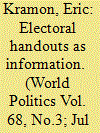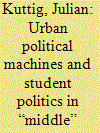| Srl | Item |
| 1 |
ID:
146056


|
|
|
|
|
| Summary/Abstract |
Why is vote buying effective even where ballot secrecy is protected? Most answers emerge from models of machine politics, in which a machine holds recipients of handouts accountable for their subsequent political behavior. Yet vote buying is common in many contexts where political party machines are not present, or where parties exert little effort in monitoring voters. This article addresses this puzzle. The author argues that politicians often distribute electoral handouts to convey information to voters. This vote buying conveys information with respect to the future provision of resources to the poor. The author tests the argument with original qualitative and experimental data collected in Kenya. A voter's information about a candidate's vote buying leads to substantial increases in electoral support, an effect driven by expectations about the provision of clientelist benefits beyond the electoral period. The results, showing that the distribution of material benefits can be electorally effective for persuasive reasons, thereby explain how vote buying can be effective in the absence of machine politics.
|
|
|
|
|
|
|
|
|
|
|
|
|
|
|
|
| 2 |
ID:
167628


|
|
|
|
|
| Summary/Abstract |
In response to the mostly Dhaka-centered research on student politics in Bangladesh, this article aims to understand political competition, the role of patronage networks, political organizations, violence, and student organizations in the provincial city of Rajshahi. The article explores how student politics in Bangladesh shapes (and is shaped by) the political dynamics in “middle Bangladesh.” Student groups in Bangladesh are closely affiliated to political parties and serve as their most important source for mobilization in a party-political regime commonly referred to as a “partyarchy.” Campus politics is deeply integrated into the urban party-political machine in Rajshahi. Controlling Rajshahi University (RU) provides a steady flow of party workers for the local party machine. Thus, the RU campus is a space for organizing political (and violent) labor as well as an important source of revenue for and the distribution of benefits by local party bosses. The urban party machine, however, is not mechanically held together merely by the dispensation of inducements – instead, it is more chaotic and contingent on a form of strategic ambiguity that disguises the structuring effects of patronage power that keeps members motivated and engaged.
|
|
|
|
|
|
|
|
|
|
|
|
|
|
|
|